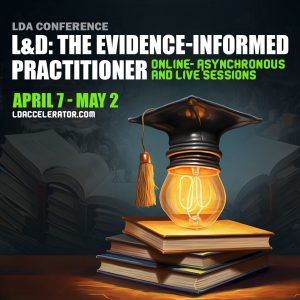 So, this is a wee bit not my normal post, but…I did want to let you know about the Evidence-Informed Practitioner conference we (the Learning Development Accelerator) are running come April. This won’t be my last post on it, of course! Still, I’ll entice you with some details, and give you a special deal. It’s too good not to let you know about the Evidence-Informed Practitioner conference deal.
So, this is a wee bit not my normal post, but…I did want to let you know about the Evidence-Informed Practitioner conference we (the Learning Development Accelerator) are running come April. This won’t be my last post on it, of course! Still, I’ll entice you with some details, and give you a special deal. It’s too good not to let you know about the Evidence-Informed Practitioner conference deal.
So, first, the conference is a follow-on to the Learning Science Conference we held last fall. That was a great conference, but there was one repeated sentiment: “but how do we do this in practice?” A fair question! And, frankly, a topic that’s gotten my mind going in other ways (stay tuned ;). So, we decided to offer a conference to address it.
First, the conference follows the well-received format we saw for that last event. We have the important topics, with canned presentations beforehand, discussions forums to discuss, and then live sessions. The presentations were great, and the emerging discussions were really insightful!
Then, we have top presenters, and I mean really top. People who’ve been there, done that, and in many cases wrote the book or built the company. Julie Dirksen, Dawn Snyder, Will Thalheimer, Lori Niles-Hoffman, Dave Ferguson, Emma Weber, Maarten Vansteenkiste, and Nigel Paine, along with Nidhi Sachdeva and Kat Koppett. These are folks we look to for insight, and it’s a real pleasure to bring them to you.
I get to offer you 10% off. You can use my code to get 10% off the regular price. The secret password is EIP10CQ. That’s EIP (the conference acronym), 10 (percent), CQ (my initials).
I realize I should’ve mentioned this all before, but it’s not TOO late. Hope to see you there, it’ll be great (as my firstborn used to say)! Look, I don’t usually do such a promotion, but I really am excited to offer Evidence-Informed Practitioner conference deals. Hope to see you there!